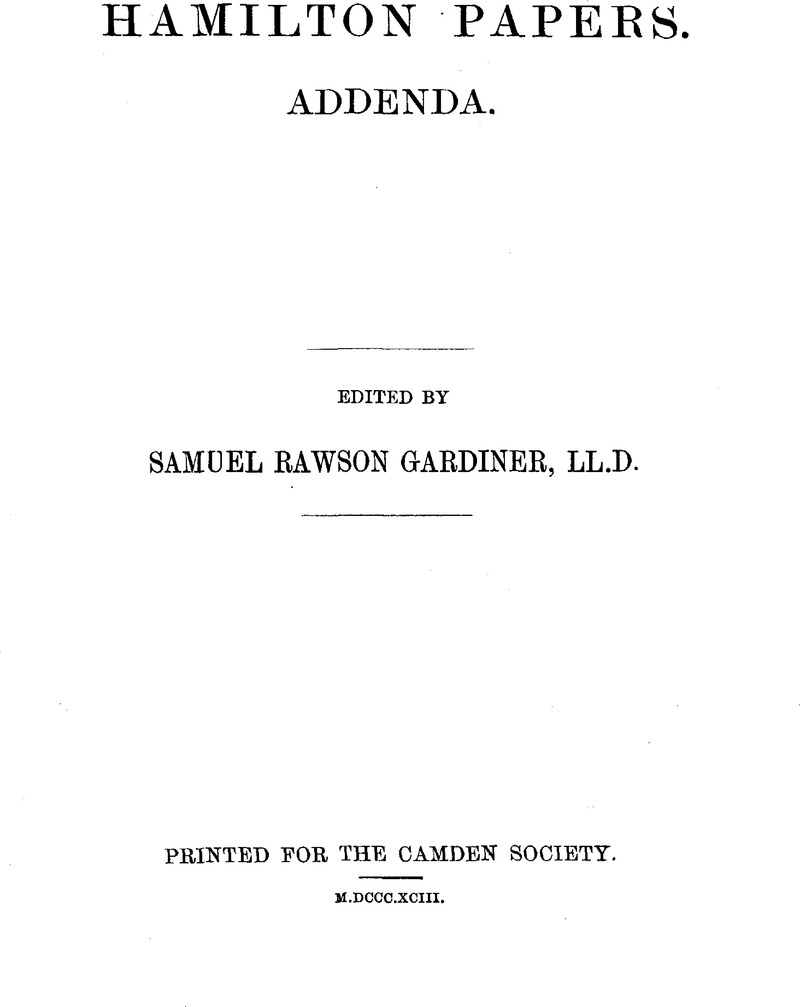No CrossRef data available.
Published online by Cambridge University Press: 24 December 2009

page 1 note a The Duke of Hamilton.
page 1 note b The Marquis of Ormond.
page 1 note c The cipher appears to give “one.”
page 2 note k The Scottish Commissioners, of whom Lanark was one, left London on January 24.
page 2 note a Amsterdam.
page 2 note b Receive.
page 2 note c Arms.
page 2 note d Money.
page 2 note e Nation.
page 2 note f Clergy.
page 2 note g Unhappy.
page 2 note h Independents.
page 2 note i Legs.
page 2 note j Monies.
page 2 note l Sir Lewis Dyves, half-brother of Lord Digby.
page 3 note a Something is omitted in this involved sentence.
page 4 note a Fenne is evidently an Englishman, and Edgar probably stands for Lanark.
page 4 note b Sic. Perhaps Ashburnham, see Hamilton Papers, 150.
page 5 note a Perhaps Mazarin.
page 5 note b Fougue.
page 7 note a Taken into consideration on Feb. 5, passed the House of Commons on Feb 11.
page 8 note a i.e. the Incident.
page 8 note b On Feb. 5.
page 8 note c Know.
page 8 note d ? the Levellers.
page 9 note a i.e.. the letter of the English Commissioners in Scotland. See C. J., v. 462.
page 9 note b Febr. 11.
page 9 note c ? to guard.
page 9 note d ? upon this.
page 9 note e ? will be.
page 9 note f ? some one.
page 10 note a Dishington.
page 10 note b ? will be.
page 10 note c ? there.
page 10 note d ? will be.
page 10 note e ? Norwich.
page 10 note f Justifying the Vote of No Addresses.
page 11 note a and.
page 11 note b asperse.
page 11 note c advice.
page 11 note d Perhaps “the power“ is omitted.
page 12 note a See p. 4, notea.
page 12 note b This probably does not refer to the day of the month.
page 12 note c Should this be “France“? See the next letter.
page 13 note a Sic.
page 15 note a ? that meditate.
page 17 note a Is this a joke or is the right name wrongly ciphered?
page 17 note b ? has been.
page 18 note a Argyll had money owed to him by the English Parliament, and the suggestion is that he would join the Hamiltons as soon as he received it.
page 18 note b “From” seems to be omitted.
page 18 note c The Countess of Carlisle.
page 21 note a ? Let me know what.
page 21 note b Firebrace.
page 22 note a Sic, ? mis-ciphered for “diversion.”
page 22 note b ? Inchiquin.
page 22 note c Sic, ? “there.”
page 23 note a “By” is probably omitted.
page 23 note b Antrim.
page 23 note c Two.
page 24 note a i.e. Hadsor.
page 24 note b ? there was nothing.
page 25 note a i.e. abetters.
page 25 note b ? be of.
page 26 note a i.e. returned in one.
page 26 note b Cheerfuller.
page 26 note c ? to go there.
page 26 note d i.e. the clergy.
page 26 note e i.e. an army.
page 26 note f ? the head of theirs.
page 26 note g i.e. name.
page 26 note h Wearies.
page 26 note a Sic, ? here.
page 28 note a ? Bamfield.
page 28 note b Under age.
page 28 note c ? The Duke of Gloucester.
page 29 note a There must be a mistake here. One would expect Parliament to be indicated.
page 29 note b April 11, Acts of Parl. of Scotl., vol. vi. part ii. 23.
page 30 note b ? Lanark.
page 30 note a for “posture.”
page 31 note a ? hath.
page 33 note a i.e. Sir Arthur Hazlerigg, Governor of Newcastle.
page 33 note b Cromwell reviewed his forces at Gloucester on May 8.
page 35 note a Courtrai.
page 37 note a ? “They take all horses and who.”
page 38 note b An impostor had personated the Prince of Wales.
page 40 note a i.e. Lauderdale.
page 40 note a Have come.
page 40 note b Conti.
page 40 note c ? Gerard.
page 40 note d Tell him more tales.
page 40 note e Discontented.
page 40 note f The cipher reads t s d.